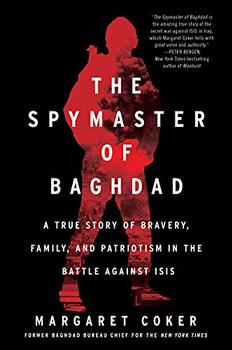Summary | Excerpt | Reading Guide | Reviews | Beyond the Book | Readalikes | Genres & Themes | Author Bio

A True Story of Bravery, Family, and Patriotism in the Battle against ISIS
by Margaret Coker
Suddenly, a piercing whistle came from down the lane. What in God's name are you playing at? You son of a whore!
A man in a dark-blue uniform appeared from nowhere, like a superhero in an American movie. His hands were the size of cinder blocks and his neck as wide as the trunk of an apple tree. He wore the clothes of a police officer and Munaf had never seen him in their neighborhood before.
The street sheikhs looked up, astonished, as the policeman picked up Hussein by the back of his shirt. His boot-bristle mustache quivered with anger. Shame on you! How dare you attack this child!
The man cuffed the young bully with a blow that sent him tumbling to the ground. Hussein landed heavily on his rear end. His face went white and then redder than a tomato. Who is your father? the police officer asked brusquely. Let's go tell him about what you have been up to.
The officer pulled the boy down the street toward the police station. The rest of the boys were dazed at the spectacle they had just witnessed.
Munaf remembers his heart pounding with excitement. The scene was the most heroic thing he had seen in his young life. Who would have ever believed that a policeman—an object of fear and derision—would be the vessel through which God revealed something wondrous? This stranger appeared like an angel and bent the law that had always been immutable in Saddam City.
Munaf couldn't put into words what he was feeling. Emotions coursed through his small body. His headache had disappeared. This was what justice looked like.
He didn't know the name of the man who had re-ordered his universe. But he knew he wanted to be like him. From that day on, he knew he wanted to become a policeman.
For years there had never been a time for Munaf to explain these feelings to his father. He didn't have the language to describe these thoughts, nor the gift of poetry like Harith. The last thing that Abu Harith would understand was a desire for his son to upset the social order.
Those born in a police state are provided no manual to navigate the ambiguities of power, where the distance between a joke and jail time can vary according to the mood of the informer. To Abu Harith the threat of arrest hovered constantly, like a swarm of wasps. His only method of inoculating his family against this peril was to mold them—and himself—into models of meekness. Obedience was his talisman.
The patriarch walked through life with his eyes down and head bowed, choosing whatever path he needed to avoid trouble. He gave his children names favored by Iraq's Sunni families, a subtle sign of obsequiousness to those authorities that would accost his children their whole lives. But to the families living in Saddam City, Abu Harith would explain his choices as venerating wise men from Islamic history. Politics was something to be avoided, especially as his government-issued identity card revealed him to be a double threat to the regime, given his permanent address and religious denomination.
For this reason, Abu Harith shunned the storied male bastion of the Arab world: neighborhood teahouses. The geography of Saddam City gave its residents few public spaces to mingle freely, so teahouses became one of the few places where men would gather after work, or spend their day if they were unemployed. Given how hard life had become, you didn't have to be political to rage about the cruelty of Saddam's regime in such convivial settings. Still, walls had ears in Iraq, just like every other totalitarian country. Merely listening to such rage left a man open to risk. If you stayed silent, you were vulnerable to being written up by the regime's informers. If you offered support for the government, you could face reprisals from the opposition groups.
When Abu Harith lost his printing business, he started writing freelance columns in pro-government newspapers and publishing poems under a pen name. As it was, meat was a scarce guest at the al-Sudani house—if his name was added to an informer's report about a teahouse conversation, even by mistake, Abu Harith would lose even that meager paycheck.
Excerpted from The Spymaster of Baghdad by Margaret Coker. Copyright © 2021 by Margaret Coker. Excerpted by permission of Dey Street Books. All rights reserved. No part of this excerpt may be reproduced or reprinted without permission in writing from the publisher.




From the moment I picked your book up...
Click Here to find out who said this, as well as discovering other famous literary quotes!
Your guide toexceptional books
BookBrowse seeks out and recommends the best in contemporary fiction and nonfiction—books that not only engage and entertain but also deepen our understanding of ourselves and the world around us.